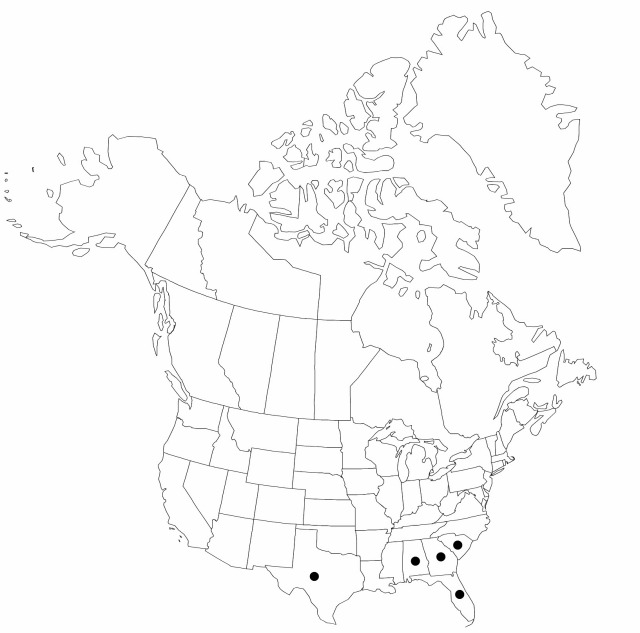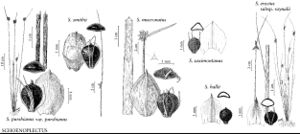Schoenoplectus erectus subsp. raynalii
Nordic J. Bot. 3: 243. 1983.
Plants annual; rhizomes 1 mm diam. Culms cylindric, ridged when dry, 0.05–0.5 m × 0.5–1 mm. Leaves 3–4, 1 cauline, nearly equaling culm; sheaths disintegrating to fibers; blades 1–2, thickly C-shaped in cross section, distally flat, from much shorter to ca. 1/2 as long as sheath, 0–200 × 0.2–1 mm, smooth or margins distally spinulose. Inflorescences capitate or of 1 spikelet or rarely with 1 or 2 branches to 3 cm; proximal bract erect, resembling leaf blades, 5–200 mm. Spikelets 1–10, 5–13 × 2–3 mm; scales straw-colored or often flanks distally bright orange-brown, central region often greenish, ovate, 2.5–3.4(–5) × 1.5 mm, smooth or awn sparsely spinulose, margins ciliolate, midrib keeled distally, apex acute, awn 0.2–0.3 mm or to 2 mm on proximal scale. Flowers: perianth absent; anthers 0.5 mm; styles 2-fid or rarely few 3-fid. Spikelet achenes blackish brown when ripe, unequally biconvex to obscurely trigonous, adaxial surface longitudinally convex and horizontally concave with a convex center, ovoid to obovoid, 1–1.6 × 1–1.5 mm, with 12–15 sharp to blunt ridges; beak 0.1 mm. Amphicarpic achenes thickly trigonous with rounded abaxial faces, ellipsoid, prominently beaked, 2.2–3.2 mm, rugose. 2n = 10.
Phenology: Fruiting summer–fall, spring (Texas).
Habitat: Wet soils or emergent, freshwater shores, temporary ponds, ditches, usually sandy and often drying areas
Elevation: 0–100 m
Distribution

Ala., Fla., Ga., S.C., Tex., Mexico (Quintana Roo, Tamaulipas), South America (Argentina, Paraguay), Asia (Vietnam), Africa, Australia.
Discussion
Many specimens of Schoenoplectus erectus subsp. raynalii are misidentified as Schoenoplectus hallii or S. saximontanus. North American Scirpus erismanae and S. wilkensii (A. E. Schuyler 1969) were placed in synonymy under Schoenoplectus erectus (J. Raynal 1976). North American plants are indistinguishable from eastern and southern African plants. Schoenoplectus erectus subsp. erectus differs in its “wrinkled” achenes with faint ridges and is reported only from Mauritius (the type locality), Madagascar, and associated islands. The name Scirpus erectus has long been misapplied in the Old World to Scirpus juncoides Roxburgh in the broad sense, which is related to S. purshianus and S. smithii in 7c. Schoenoplectus sect. Actaeogeton.
Selected References
None.
